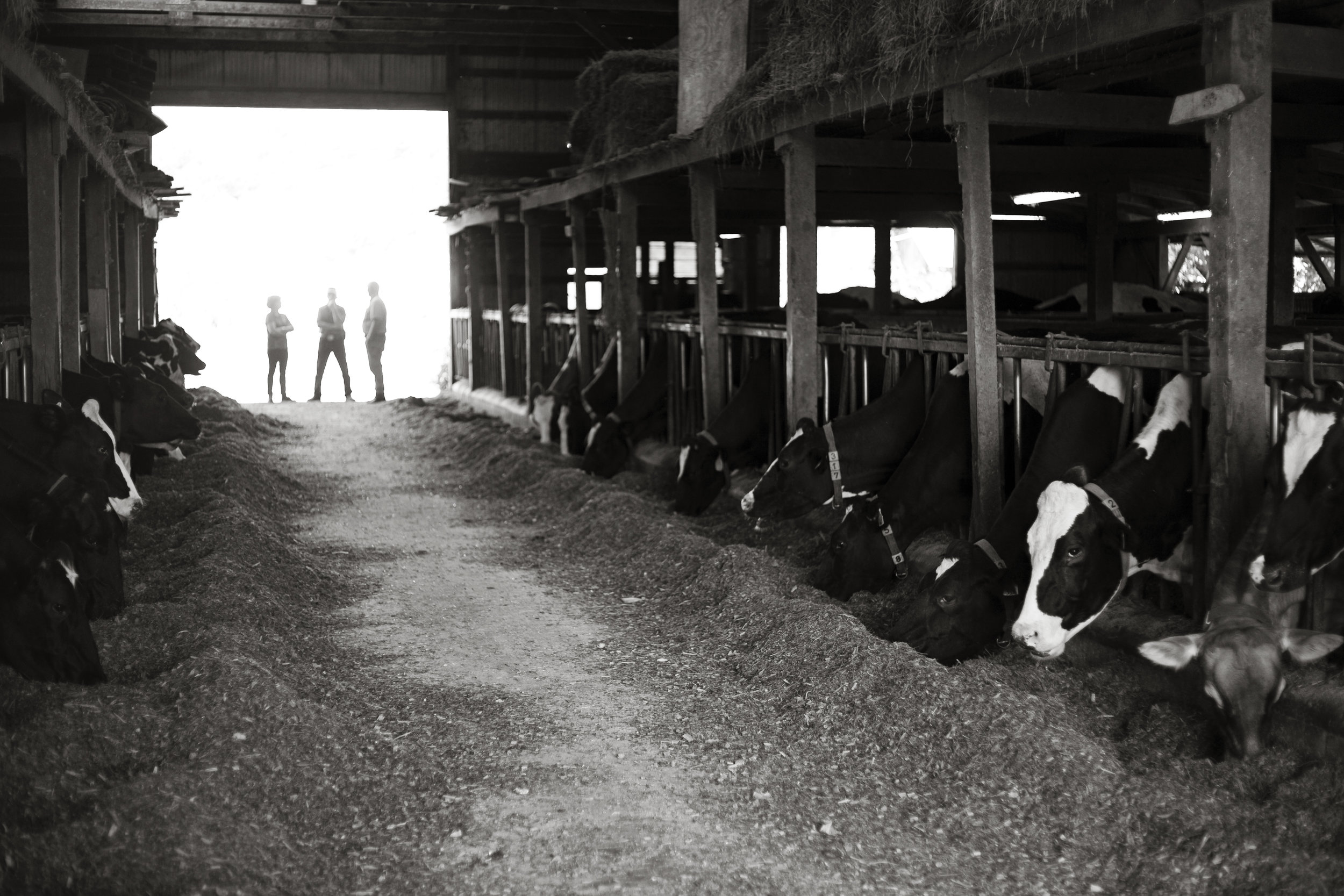
Farm Stress Management
NY FarmNet is here to support farmers, farm families, agricultural service providers, veterinarians,
milk truck drivers, and others involved in the agricultural industry in New York State.
Call us today 1-800-547-3276.
New York State farmers constantly deal with stress. Farm families’ heritage, identity, pride, and finances are tied directly to the farm. Farm families can also experience stress as the result of a sudden event—such as crop loss, an accident, a personnel change, or a family death. In other instances, it may be a gradual change from a prolonged physical illness, excessive working hours, or relationship difficulties. All of these elements and family relationships put pressure on NY’s farm families. Use this information to inform yourself, and help become a resource for your family, neighbors, and community members.
Stress Management in Uncertain Times
Managing Financial Stress on the Farm
Warning Signs of Stress
Change in routines: Farmers or members of the farm family may change who attends a market, stop attending regular meetings or religious activities, drop out of other groups, or fail to stop at the local coffee shop or feed mill.
Decline in the care of domestic animals: Livestock or pets may not be cared for in the usual way.
Increase in illness: Farmers or farm family members may experience more upper respiratory illnesses (cold, flu) or other chronic conditions (aches, pains, persistent cough, migraines).
Increase in farm accidents: The risk of farm accidents increases with fatigue or loss of ability to concentrate. Children may be at risk if there isn’t alternative child care.
Decline in appearance of farmstead: The farm family no longer takes pride in the way farm buildings and grounds appear.
Signs of stress in children: Farm children may act out, show a decline in academic performance, or be increasingly absent from school. They may also show signs of physical abuse or neglect, or become depressed.
Decreased interest: Farmers or farm families may be less willing to commit to future activities, sign up for gatherings, or show interest in community events.
Signs of Chronic, Prolonged Stress
When farm families are under stress for long periods of time, members of the family may exhibit:
• Headaches, backaches, etc. • Irritability • Depression • Ulcers • Anger • Passive-aggressiveness • Frequent sickness • Exhaustion • Loss of humor • Memory loss • Self-judgment (e.g., “I blew it.”) • Lack of confidence (e.g., “Why can’t I…?”) • Sadness • Bitterness • Withdrawal • Sleep disturbances • Loss of spirit • Substance abuse • Violence • Lack of self-confidence (e.g., “I’m a failure.”) • Lack of concentration • Difficulty making decisions
Signs of Depression or Suicidal Intent
The greater the number of signs of stress a farm family member is exhibiting, the greater the need for additional help and support. If farm family members are exhibiting the following signs of depression or suicidal intent, it is important that they get help as soon as possible. Many of these are signs and symptoms of fatigue and stress. However, when there are multiple signs, they should be taken seriously. If there are significant changes in the way someone typically functions, they may need immediate help or intervention.
Appearance: Sad face, slow movements, unkempt appearance, lack of facial expression
Anxiety and/or depression: Severe/intense feelings, the appearance of anxiety or depression (both may be present)
Unhappy feelings: Feelings of sadness, hopelessness, worthlessness
Withdrawal or isolation: Reclusiveness, discouragement, listlessness, rejection of friends and support
Negative thoughts: “I’m a failure,” or “I’m no good”
Helpless and hopeless: Sense of complete powerlessness, a sense that no one cares.
Reduced activity: Absence of planning, increased sleeping, feeling that “doing anything is just too much.”
Substance abuse
People problems: Lack of interest in being social (“I don’t want anyone to see me.”)
Previous suicide attempts: Previous attempts are important signs, regardless of the severity.
Physical problems: Sleeping problems, decreased appetite, various physical ailments from aches and pains to severe muscle tension or chronic pain
Suicidal plan: Frequent or constant thoughts of a specific suicide plan
Guilt and low self-esteem: “It’s all my fault,” or “I should be punished.”
Cries for help: Making a will, giving away possessions, making statements such as “I’m calling it quits” or “Maybe my family would be better off without me.”
How to Help
Listen. Provide opportunities for the farmer or family member to talk about what they are going through. You don’t need to have answers, but be aware of local resources so that you can refer them.
Listen for signs that the individual needs more than a sympathetic ear—signs that the person needs professional help that you can’t provide, such as financial, legal, or personal counseling.
Access the agency or community resource most appropriate to address the person’s (or family’s) problem.
Discuss the referral with the person or family (“It sounds/looks like you are feeling _____. I think ____ could help you deal with your situation.”)
Explore the individual’s or family’s willingness to initiate contact with the community resource (“How do you feel about seeking help from this person/agency?” or “Can I help you contact _____ at this agency?”)
Muckville
A Documentary about farm stress, mental health, and the strength to seek help.
Chris Pawelski almost ran out of time. As a 4th-generation onion farmer on the post-glacial black dirt of Goshen, NY, Chris is just one of millions of farmers in America facing the unnecessarily Sisyphusian task of earning a living. "Muckville" follows the story of Chris's family farm through time, from the 'Polish wave' of the early 20th century, through the onset of climate change-driven crop failures in the 1990s and subsequent pitfalls of US agriculture policy, and Chris's resulting existential crisis.
This short documentary provides rare insight into the ongoing mental health epidemic on American farms, and paints a delicate and emotional portrait of resilience and love amid unbeatable odds.
A winner of HUDSY's 2023 Community Content Fund Program. Directed, photographed, and edited by Jeff Mertz.
Watch the full documentary for free on Hudsy at https://watchlocal.hudsy.tv/programs/muckville
If you are concerned about yourself or somebody else, reach out.
In an emergency, call 911.
National Suicide Prevention Lifeline
Dial 988.
Crisis Text Line
Text “Got5” to 741-741
Unsure of where to turn for resources
or assistance? Call 211
Additional Resources
Identifying Signs of Stress in Farm Families
How Farmers Can Cope with Stress
National Shooting Sports Foundation Suicide Prevention Program
Veterinarian and Healthcare Professionals Guide to Suicide Prevention
World Health Organization’s Doing What Matters in Times of Stress - available in multiple languages
NYS Office of Mental Health - Office of Diversity and Inclusion Resources

